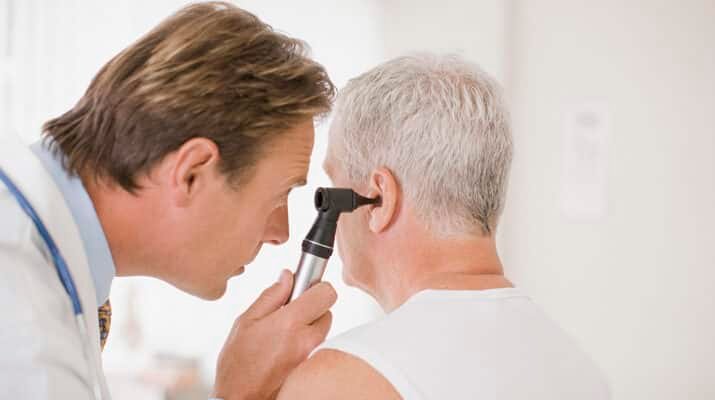It’s about more than missing conversations and cranking up the TV
By Deborah Jeanne Sergeant
Your spouse may continually ask you to turn down the TV. Or perhaps repeat herself louder so you can hear. It may seem like “everyone mumbles” these days.
But you have even more reasons to have a hearing exam. Untreated hearing loss can eventually bring other unpleasantries to your life.
A study from the National Health and Nutrition Examination Survey followed a population of younger people with hearing loss. Those who treated their hearing loss and used appropriately fitted hearing aids regularly lived longer than those who didn’t. The aids may reflect an overall better engagement in self-care than in the shorter-lived population. But it could also reflect an increased fall risk among people with untreated hearing loss. Older adults who experience falls are at risk for breaking bones and subsequent life-threatening deconditioning.
Another aspect of fall risk and hearing loss is that the individual may focus on trying to hear what’s around them.
“Balance issues occur with hearing loss because of working memory,” said Doug Brown, audiologist and owner of dB Audiology Associates, P.C. in Syracuse. “If you’re concerned about listening, you may not be able to walk as well because not all the resources can be spread that thin. The effort in communicating takes away your effort in walking.”
Untreated hearing loss may also correlate with cognitive function. Brown said that recent studies indicate dementia is associated with hearing loss, but whether it is causal is still unclear.
“We recognize that social withdrawal, which means you’re not as active mentally and cognitively, can probably contribute to cognitive decline, but it’s not 100% clear that hearing loss in and of itself is a causative factor. Have your hearing evaluated to see if there’s loss or if there could be cognitive problems.”
Quality of life is another reason to treat hearing loss. It can shift the family dynamics as the partner with untreated hearing loss must rely increasingly upon the one who hears better, such as ordering dinner at a restaurant, answering the phone, talking with medical providers or making reservations. This effect further narrows the individual’s scope of human interaction and conversation.
“It’s nice to be able to have enhanced hearing to hear leaves rustling, birds singing and babies laughing,” Brown said. “The most common reason people come is because of difficulty with communication like hearing in noisy situations. That leads to social withdrawal because you don’t enjoy those activities as much. Hearing loss leads to greater listening fatigue and there’s more frustration on both sides of the conversation and you have to ask people to repeat.”
Hearing well can help make better connections between current stimuli and memories. For example, hearing snow crunch under one’s boots can elicit a memory of sledding as a child. Without hearing that sound, the memory would not surface.
Another reason to have a hearing exam is to rule out other reasons for diminished hearing. Brown has discovered issues such as a benign tumor in a patient that slowly diminished her hearing as it grew. Having it removed prevented hearing loss from progressing and prevented facial function damage.
“There are also infections and other problems,” Brown added. “Having a hearing evaluation can help you get treatment sooner. Ignoring the problem and telling people to speak up ignores the reasons that the hearing loss is happening.”
Seeking an exam and following through with any prescribed hearing instruments should happen sooner than later, as Brown said those who wait have a harder time adapting. Unfortunately, many people delay seeking help, as they do not want to bother with seeing another specialist. They may also hold onto stigma about hearing aids being “for old people.”

Kris Rookey, hearing instrument specialist and owner of Port City Hearing in Oswego, said that hearing aids “have advanced tremendously over the years. They’re very smart in identifying a human speech frequency and other sounds.”
They’re no longer simple amplifiers but are custom made to address each ear’s hearing needs and can self-adjust to the environment in real time while the person wears them. But Rookey said that the most crucial factor isn’t the equipment but the examination and fitting—and having these take place sooner than later.
“We want to get stimulation to the nerves and brain,” he said. “We want to slow it down. It’s harder to treat if you wait until it’s bad. Your hearing does decrease over the years. But people who wait, their discrimination and understanding decrease first. It’s important to get that stimulation early on.”
Anyone who notices changes in his hearing or whose family notices changes should schedule an exam. Most insurance covers exams and hearing instruments at least in part. If the provider does not identify hearing loss, the exam can serve as an important benchmark for future exams. Most primary care providers do not screen for hearing loss, so it’s important for patients to advocate for themselves.

